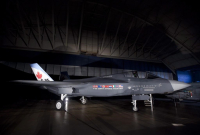Support strong Canadian climate journalism for 2025
Canada has formally asked four companies to submit bids to supply a new fleet of state-of-the-art fighter jets, the latest step in the country's almost decade-long quest to upgrade its air force.
The federal department responsible for procurement said Tuesday that Saab, Airbus, Lockheed Martin and Boeing have until next spring to present initial proposals to provide 88 advanced fighters for the Royal Canadian Air Force.
The jets — part of a procurement package worth about $19 billion — are to replace the country's aging CF-18s, which have been in service for more than 35 years.
A winning bidder will be chosen in 2022, with the first plane scheduled to arrive "as early as 2025," the government said.
"This is the most significant investment in the Royal Canadian Air Force in more than 30 years," said a statement by Public Services and Procurement Canada. "With it, the government will deliver the aircraft that meet Canada's needs, while ensuring good value for Canadians."
Canada's efforts to buy new fighter jets have crawled along for close to a decade.
The previous Conservative government announced in 2010 it would buy 65 F-35s, which are built by Lockheed Martin, without a competition, The first one was to be delivered in 2015.
The Conservatives later backed off their plan over concerns about the price and the Defence Department's tactics in getting government approval for the deal.
During the 2015 federal election campaign, Justin Trudeau's Liberals vowed to launch a competition immediately to replace the CF-18s — but not to buy the F-35. The Trudeau government, which replaced the Conservatives in 2015, later said the Lockheed Martin would be allowed to compete for the contract with its F-35 after all.
The Liberals launched the current procurement in 2016 and have been working on the details ever since.
Until the new jets arrive, the Liberal government has announced plans to upgrade Canada's CF-18s. It has also signed a contract to buy 18 second-hand jets from Australia, a deal that officials have pegged at around $500 million.
Conservative MP James Bezan, the party's critic for defence, criticized the Liberal government for delays in replacing the fighter jets. Other countries, he said in a statement Tuesday, chose their new jets in under two years.
"It is inexcusable that Justin Trudeau spent the past four years dithering on the fighter-jet file," Bezan said.
He added, without providing details about how this would work, that if the Conservatives win October's federal election they will "immediately select a new fighter jet through a fair and transparent competition."
The F-35 will be up against Airbus's Eurofighter Typhoon, Saab's Gripen and Boeing's Super Hornet. French company Dassault pulled its Rafale from contention late last year.
The big-ticket purchase is expected to provide a boost to the country's economy.
On Tuesday, the government said the investment will provide decades of support to Canada's aerospace and defence industries.
The government points out the bidders will have to show they have plans to invest as much in economic benefits for Canada as the eventual contract is worth.
The proposals will be evaluated on technical merit (60 per cent), cost (20 per cent) and economic benefits (20 per cent), the statement said.
The suppliers have until this fall to demonstrate that they can meet requirements for security and interoperability with allied countries' forces, and until spring 2020 to make what the government calls "initial proposals."





Comments
The length of time it takes to bring a "state of the art" military jet into service guarentees that it will be obsolete as soon as it takes to the air. This is the conundrum that stymies the efforts of smaller national economies in their efforts to maintain military equivalence with the world's massive war mongers. This truly is a zero-sum game - indeed, all military pretensions are, ever since humanity invented the ultimate extermination weapon.
The so-called leadership of the earth's populations cannot seem to make that leap of rationality and they continue to act like they can "win" with their ultimate weapons of annhiliation.. They certainly can't articulate just exactly what "winning" means in this context. The ultimate lose-lose proposition
Exactly!! And this is not to mention the filthy pollution that the military spews out!! (I refer to online publications from World Beyond War).
So what are the "economic benefits - 20% - mentioned here? - that is, besides those to the military-industrial complex...!!